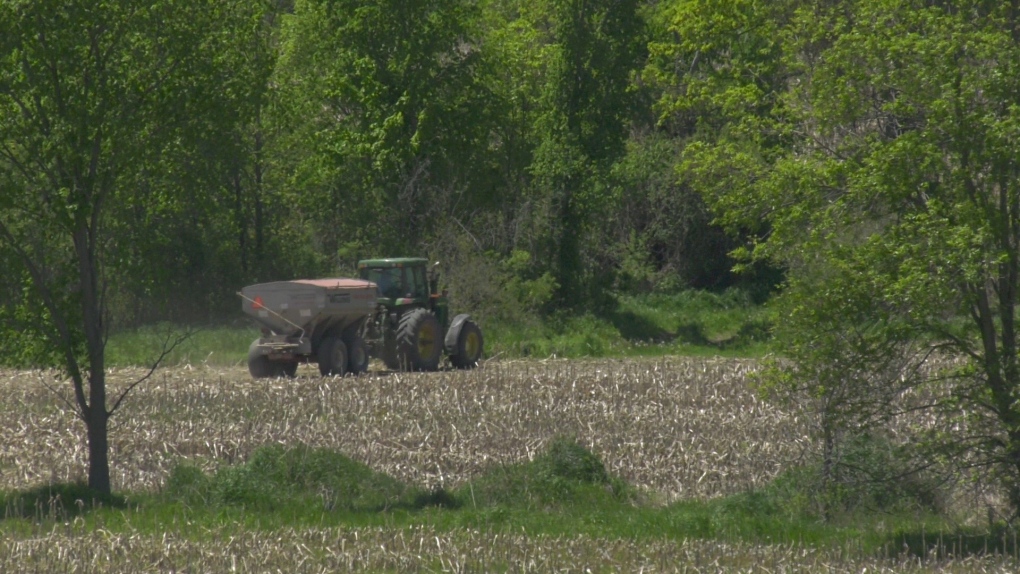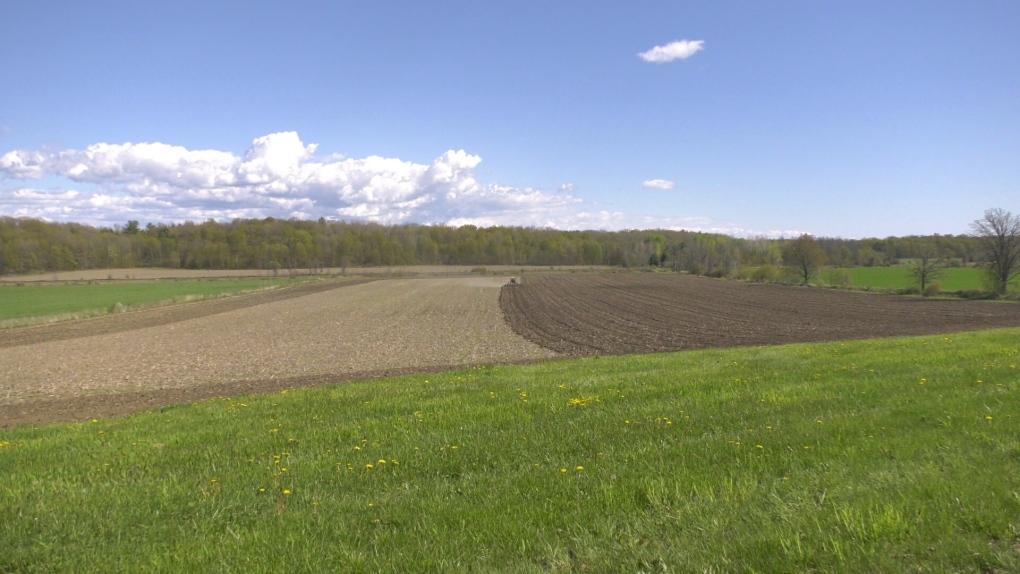'Once it's gone, it's gone': Farmers seek to reverse bill that could see farmland vanish
Ontario's agriculture sector has launched a campaign against an Ontario government bill that they say will destroy farmland. The law could see agricultural land used for housing, which farmers say is a loss they can never get back.
As spring planting season wraps up for many Ontario farmers, farmer Andreas Baumann says his peers may not notice a bill being proposed that could drastically change their livelihood.
"Most farmers are too busy to think about this kind of stuff," Baumann told CTV News Ottawa. "We're working 12-16 hours a day. It's a nice time to push something through that could affect us negatively."
Bill 97, the 'Helping Homebuyers, Protecting Tenants Act,' is designed to reshape development rules to address housing supply and affordability. A Proposed Provincial Planning Statement released in April by the Ministry of Municipal Affairs and Housing recommends changes to give municipalities the ability to split up large farms into smaller lots for new homes.
But farming organizations say it will reshape the land, limit farm growth, and inflate land prices.
"In our business, we don't plan on parcelling anything off," Baumann said, "We're young, my brother and I are both 40 and under, so we've got another 20-30 years. We want to farm."
"But I can see where there's guys at the other end of the spectrum that are probably looking at dollar signs and could benefit from it," he added.
More than 14 agriculture associations have joined forces to put pressure on the provincial government to reverse the proposal, including the Ontario Federation of Agriculture (OFA), which have held discussions with the government.
 Farmer Andreas Baumann prepares to spread fertilizer on his fields. (Nate Vandermeer/CTV News Ottawa)
Farmer Andreas Baumann prepares to spread fertilizer on his fields. (Nate Vandermeer/CTV News Ottawa)
In a statement to CTV News Ottawa, OFA Eastern Ontario Regional Director Jacqueline Kelly-Pemberton says, "We are encouraged by recent discussions with Premier (Doug) Ford and Minister (Lisa) Thompson. We look forward to working together on a resolution that will both support housing goals and continue to protect Ontario's farmland."
Data from the 2021 Census of Agriculture suggests that Ontario is already losing 319 acres of farmland a day - equal to the loss of one family farm daily. Baumann says the government should be looking at the European model to increase housing.
"We need to build where we've already been building and not necessarily be taking away more land for just housing," he said.
"A lot of cities in Europe, and even towns and villages, they are going up instead of out. It's a lot cheaper to build up when water, sewer, hydro is already there," Baumann said.
"To build on raw farmland out here in the country, you're looking at $100-200,000 before you ever start building the house. It won't in any way ever be affordable housing," he added.
 Farmland near Lyn, Ont. in May 2021. (Nate Vandermeer/CTV News Ottawa)
Farmland near Lyn, Ont. in May 2021. (Nate Vandermeer/CTV News Ottawa)
Another issue is the influx of people accustomed to the city, moving to the country, which has its own unique sounds and smells.
"It's Friday today so I'm going to be pretty nervous heading back to our home farm this afternoon," Baumann said. "As more people move to the country, our tractors are in the way, our big equipment is in the way, people are just in a big hurry and we feel quite unsafe on the roads."
Bill 97 passed second reading at Queen's Park on May 11, and is open to debate before it proceeds through the legislature.
"Once farmland is gone, it's gone," Baumann said. "The good Lord's not making any more of it. What we have is what we have. We've got to protect it."
A spokesperson for Minister of Municipal Affairs and Housing Steve Clark issued a statement to CTV News Ottawa on Friday evening, saying the Ontario government's goal has "always been to support farmers, their families and agricultural workers by increasing the supply of homes near their place of work.
"That is why, we have put forward, for consultation, a thoughtful draft proposal that would establish specific criteria to allow farmers the voluntary option of adding additional residential lots to their own land," the spokesperson said.
"The government intends to extend the commenting period on the Environmental Registry of Ontario beyond the original closing date of June 5. This will give the public a greater opportunity to comment on the proposals and will give our government more time to consider alternative solutions to support multi-generational farm families while addressing the concerns that have been raised over the current proposal."
CTVNews.ca Top Stories

Joe Biden pardons son Hunter Biden of gun, tax charges, despite promising not to
U.S. President Joe Biden announced Sunday that he pardoned his son Hunter Biden on gun, tax charges, despite previous promises that he would not do so.
Canada Post presents union with 'framework' to reach deal as strike continues
Canada Post has presented the union representing some 55,000 striking postal workers with a framework to reach negotiated agreements, the corporation said.
'Devastating': Missing Surrey, B.C. teen found dead, family says
The family of a missing 18-year-old, who was last seen in Surrey over a month ago, says there has been a tragic end to the search.
The best tips to prepare your car for the winter
Slippery or snow-covered roads, reduced visibility and bitter cold are all conditions that can make driving difficult and even dangerous during cold weather months. CAA spoke with CTV Morning Live this week on some of the best ways you can winterize your car.
PM Trudeau 'surprised' provinces unanimous on accelerated defence spending: Ford
Ontario Premier Doug Ford says his fellow provincial leaders are united in pushing for Canada to meet its NATO defence spending targets ahead of schedule, and that Prime Minister Justin Trudeau was "surprised" to hear it.
Stellantis CEO resigns as carmaker sales continue to slump
Stellantis CEO Carlos Tavares is stepping down after nearly four years in the top spot of the automaker, which owns car brands like Jeep, Citroën and Ram, amid an ongoing struggle with slumping sales.
'Wicked' star Marissa Bode speaks out against 'harmful' ableist comments made about her character
'Wicked' actress Marissa Bode posted a video on TikTok asking for kindness after receiving ableist comments on social media.
Poilievre calls for asylum seeker cap, border plan as U.S. tariff threat looms
Conservative Leader Pierre Poilievre has demanded the federal government present a plan before Parliament to beef up border security as U.S. president-elect Donald Trump threatens to impose stiff tariffs on Canada.
Emergency crews battle large fire at Kitchener, Ont. townhouse complex
Waterloo Regional Police say Kingsway Drive will remain closed as emergency crews continue to battle a large blaze at a townhouse complex.

































